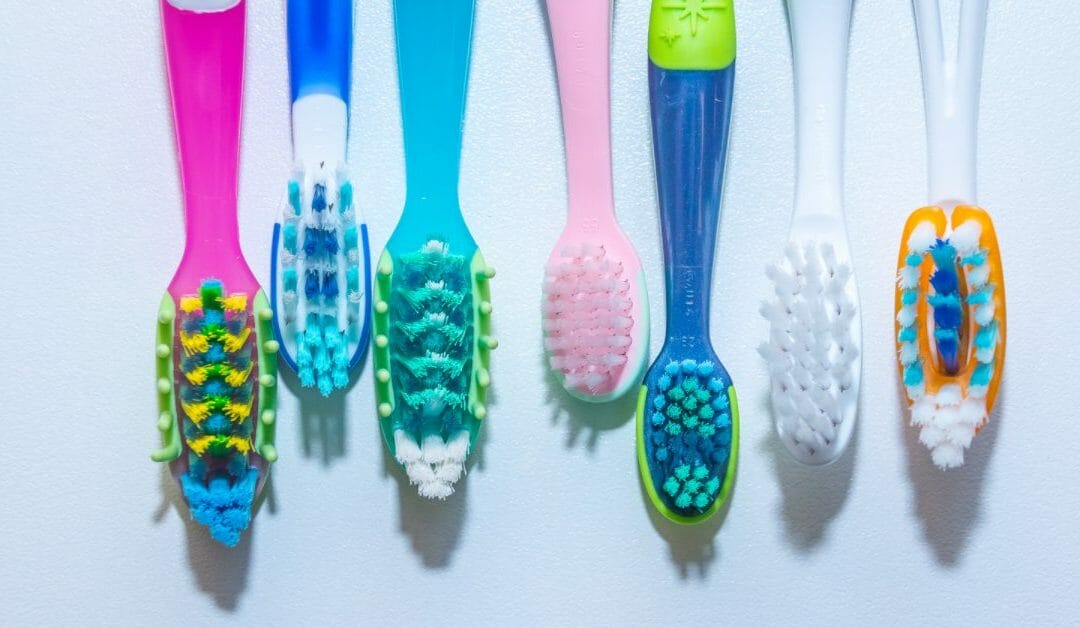Most patients leave their dentist appointments with a new toothbrush to take home. However, replacing your toothbrush only when you visit the dentist, once or twice a year, might not be often enough. That’s right! Toothbrushes wear out over time and after enough use, and once they are worn out, they do not clean your teeth and gums as effectively as before. When this happens, it is vital to your oral health that you replace your worn-out toothbrush with a new one.
5 Signs That You Need to Change Your Toothbrush
1. Your Teeth Do Not Feel as Clean After Brushing
If you just brushed your teeth, but they still have a fuzzy, not-so-clean feel when you run your tongue over them, then you need to replace your toothbrush. This is a sign that either you suddenly are not brushing your teeth as effectively as before or your toothbrush is not working as well as before because it is likely worn out.
2. The Bristles Are Frayed
A good toothbrush’s bristles should stand up straight and readily spring back to their upright position after being pressed down. If your toothbrush bristles are bent or frayed as if they have seen much better days, then it is time to get a new toothbrush.
3. It Has a Smell
Any odor is a sign that bacteria are present. (Having bacteria inside our mouths is why our breath sometimes smells bad.) If your toothbrush smells, then it is likely harboring bacteria, bacteria that could be harmful to your oral and general health. This bacteria will prevent your toothbrush from keeping your teeth and gums happy because it will introduce bacteria into your mouth every time you brush.
So, if your brush stinks, it is time to get a new one, completely free from bad smells.
4. You Were Recently Sick
As we learned in the previous point, toothbrushes can harbor bacteria. They can also provide a place for viruses to hang out, too. If you have been sick and are feeling better now, you need to replace your toothbrush. Continuing to use a toothbrush that you used while being sick with any kind of infection could put you at risk of reinfecting yourself. Additionally, if you store your toothbrush in a cabinet or holder along with your family’s brushes, your toothbrush could put them at risk of catching your illness, too.
5. You Do Not Remember When You Last Replaced It
Toothbrushes usually need to be replaced every few months. So, if you can’t remember the last time you got a new toothbrush or fitted your electric toothbrush with a new head, then it has likely been too long and you should replace it.
How Long Do Toothbrushes Usually Last?
Like many questions related to dental health, the answer to this question depends on a few different factors such as the type of toothbrush you use, how often you brush your teeth, and how much pressure you use when you brush your teeth. (Hint: Applying too much pressure can harm your gums and damage your tooth enamel!) The more frequently and vigorously you brush your teeth, the more often your toothbrush will need to be replaced.
Typically, a regular, manual toothbrush will need to be replaced every three to four months. Electric toothbrush heads need to be replaced every one to three months on average, depending on the recommendation from the toothbrush manufacturer.
What’s the Best Kind of Toothbrush to Use?
If you’re brushing for two minutes, twice a day, using the proper brushing technique, then a manual toothbrush can sufficiently clean your teeth and gums. However, we strongly recommend using an electric toothbrush, like a Sonicare, that uses high-frequency sound waves to gently vibrate the plaque and bacteria right off of your teeth and gums.
Electric toothbrushes clean teeth much more efficiently and effectively than manual toothbrushes, getting in countless more “brush strokes” than a manual toothbrush during the recommended two minutes of brushing. Plus, electric toothbrushes ensure you brush each quadrant of your teeth for the proper amount of time while also making it easier to avoid pressing the toothbrush too hard against your teeth and gums.
Maintain Good Oral Health With Regular Professional Dental Cleanings and Examinations With Our West Bend Dentist
In addition to brushing twice a day and flossing every day, scheduling regular dental appointments for a routine dental cleaning and checkup are essential to maintaining your good oral health, preventing tooth decay and gum disease, and catching any oral health concerns early before they develop into more complex problems.
Most healthy adults should have their teeth cleaned twice a year and examined at least annually by a dentist. If you have been diagnosed with gum disease (periodontal disease) or another oral health problem, you might need to see the dentist more frequently for ongoing management and dental cleanings.
To learn more about brushing your teeth and other preventive dental treatments available (such as fluoride treatments and dental sealants), we welcome you to contact Dentistry of West Bend today. We offer a comprehensive menu of preventive and general dentistry treatments designed to restore and maintain good oral health in all of our patients.


Recent Comments